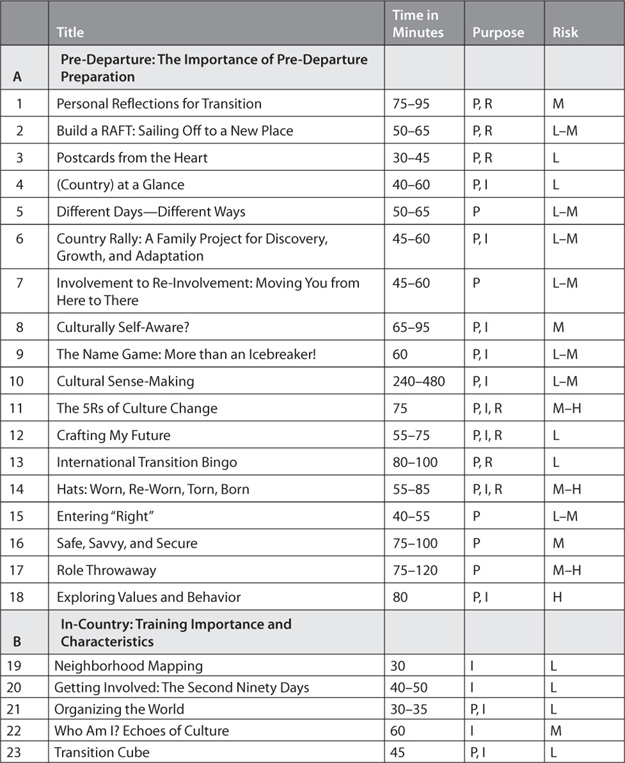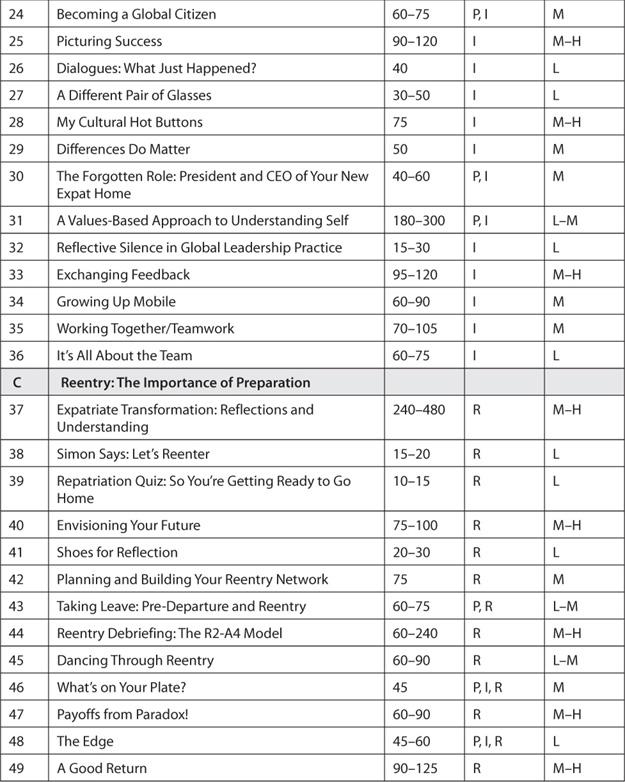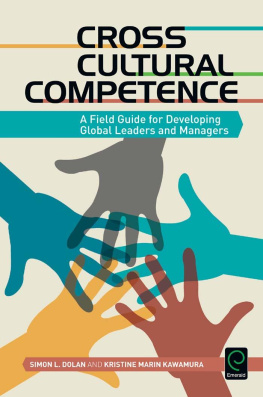52 Activities for Successful International Relocation
52 Activities for Successful International Relocation
Patricia A. Cassiday, Donna M. Stringer

First published by Intercultural Press in 2015.
|
|---|
20 Park Plaza, Suite 610 | 3-5 Spafield Street, Clerkenwell |
Boston, MA 02116, USA | London, EC1R 4QB, UK |
Tel: + 617-523-3801 | Tel: +44 (0)20 7239 0360 |
Fax: + 617-523-3708 | Fax: +44 (0)20 7239 0370 |
www.nicholasbrealey.com
2015 by Patricia A. Cassiday and Donna M. Stringer
All rights reserved. No part of this publication may be reproduced in any manner whatsoever without written permission from the publisher, except in the case of brief quotations embodied in critical articles or reviews.
Printed in the United States of America
20 19 18 17 16 15 14 1 2 3 4 5 6 7 8 9 10
ISBN: 978-0-9839558-8-7
E-ISBN: 978-0-9839558-9-4
Library of Congress Cataloging-in-Publication Data
Cassiday, Patricia A.
52 activities for successful international relocation/Patricia A Cassiday,
Donna M. Stringer.
pages cm
ISBN 978-0-9839558-8-7 (paperback) -- ISBN 978-0-9839558-9-4
(e-book) 1. Cross-cultural orientation--Activity programs. 2. Visitors,
Foreign--Life skills guides. 3. Students, Foreign--Life skills guide. 4. Foreign
workers--Life skills guide. I. Stringer, Donna M. II. Title. III. Title: Fifty-two
activities for successful international relocation.
GN345.65.C37 2014
303.482--dc23
2014013197
Contents
Acknowledgments
This book has evolved from the successful and challenging experiences of international transition and travel shared by the authors, their colleagues, and their many friends. These personal and professional experiences have led us to appreciate the importance of effective training during pre-departure, in-country, and especially during the reentry period. Training issues become even more critical as organizations and individuals strive to develop cross-cultural insights and competencies.
This book is possible because of the generosity of our colleagues and friends, who have kindly shared their ideas, their writing, and their research. We are especially grateful to the three individuals who wrote introductions to each of the sections of this book: Stephen T. Duke, who introduces readers to pre-departure training; Joyce Osland, who helps readers think about in-country training; and Bruce LaBrack, who outlines why and how reentry training is important. This collection of introductions and exercises is truly a collaborative effort, and we thank everyone who participated.
We owe much of our education and intercultural insights to our years of work with the Intercultural Communication Institute in Portland, Oregon, and the Society for Intercultural Education, Training and Research; both organizations are central to the ongoing development of leading-edge ideas in the intercultural field and have been central to forging both our understanding and application of intercultural practice.
We also thank the editorial and production team at Intercultural Press for their expertise and careful editing. As always, no book can be done without a team like we had at the press.
We hope this book is useful to you. Please modify the activities to meet the needs of your audienceas we have through the years.
The authors have made every effort to cite and acknowledge all those from whom research, lecture material, or activities have been adapted.
Classification of Activities



Purpose | Risk |
P = Pre-Departure | L = Low |
I = In-Country | M = Medium |
R = Reentry | H = High |
Introduction
Living in a foreign culture is like playing a game youve never played before and for which the rules have not been explained very well. The challenge is to enjoy the game without missing too many plays, learning the rules and developing skills as you go along.
Youll learn a great deal, though much of it will be intangible and difficult to define. In negotiating the unfamiliar and uncharted territory of another culture, change and growth occur at deep levels, leaving you more competent, more self-assured, and more knowledgeable about yourself and how the world works.
L. Robert Kohls (2001, p. 131)
Change
Change is the antecedent of transition!
When circumstances in our life change, we must accommodate the change in some way. Change may occur intentionally, because of something we choose, or as the result of something beyond our control. Change may be viewed as either positive or negative, depending on the external effect it has on our life and/or a more subtle internal influence. Change frequently results in a symbolic ending of what was. When something ends, there is groundwork for new possibilities, new realities, and even a new way of being and/or a new way of living.
Transition
Transition is the process of letting go of the past and moving into the new circumstances resulting from change. Transition offers the opportunity for personal growth, self-renewal, and enhanced creativity. The transition process requires time. When the transition process involves an international move, the individual has an opportunity to expand his or her worldview while exploring the cultural paradigms that influence perceptions and assumptions, learning how to survive and succeed in a foreign culture.
Self-Awareness
Each culture has both explicit and implicit values, beliefs, and assumptions that define the cultures frame of reference and form the foundation for that cultures socialization process. Members of the culture learn to depend on these norms for consistency in how things are done in the world. When individuals travel to another culture, they encounter new frames of reference, and for many people this encounter challenges the assumptions, values, and beliefs that have been framing the foundation of their own identity.
Janet Bennett (1998) suggests that culture shock is actually a subcategory of the transition experience. The challenge of cross-cultural adaptation has the potential for being a positive as well as a negative experience. Cultural transition, as a life-changing experience, offers the opportunity for personal growth and increased self-awareness. As an individual seeks to establish effective communication and build meaningful relationships under new cultural rules, introspection becomes a necessity.
International Transition
As pre-departure trainers consider international transition, they need to recognize that the participants fundamental needs for survival must be met before their other needs can be addressed. Pre-departure programs too often attempt to deal with cultural differences and language skills at a time when the primary needs and anxieties for those departing are focused on questions of day-to-day living.
Next page








